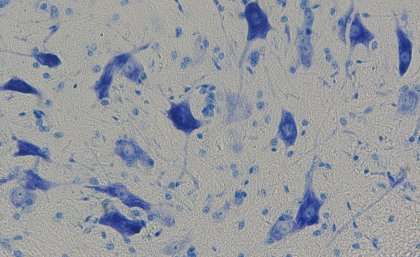Research to delay motor neuron loss

University of Queensland researchers have identified a potential treatment to delay motor neuron loss and symptoms in the inevitably fatal motor neuron disease (MND).
School of Biomedical Sciences researcher Dr Karin Borges said triheptanoin, a synthetic triglyceride oil, might help to address problems with energy metabolism associated with the neurodegenerative disease.
"MND is characterised by degeneration of motor neurons in the brain and spinal cord which leads to muscle weakness, paralysis and death, usually due to respiratory failure," Dr Borges said.
"There is evidence showing the disease interrupts the process providing the primary cellular energy source necessary for cell function and survival."
Dr Borges' research tested if giving oral triheptanoin could prevent cell death and symptom onset in an animal model of MND.
"We found that motor neuron loss was reduced by a third and loss of limb strength and body weight were delayed," she said.
"Our data showed an improvement in disease symptoms when treatment was initiated prior to their onset.
"This raises hope that triheptanoin may be able to preserve motor neuron and muscle function when treatment is started at an early stage of the disease.
"Given the difficulty in diagnosing MND, more research is needed to determine whether the treatment could be effective when a patient already has obvious muscle or neuron impairment."
Triheptanoin is an investigational medicine being developed by Ultragenyx Pharmaceuticals for patients with fatty-acid metabolism disorders and Glucose Transporter Type 1 Deficiency Syndrome, which leads to epileptic seizures in young children.
Triheptanoin has been shown to be well-tolerated in early stage clinical trials.
Dr Borges said a third of people with MND lost weight rapidly, and those with a higher body mass index (BMI) survived longer than those with a lower BMI.
"One of the interesting properties of triheptanoin is that it helps the body to extract more energy from normal food, as well as providing additional fuel."
"This could be very important for patients with this rapidly progressive disease."
There is no cure for MND, which is also known as Amyotrophic Lateral Sclerosis (ALS).
More information: Tesfaye W. Tefera et al. Triheptanoin Protects Motor Neurons and Delays the Onset of Motor Symptoms in a Mouse Model of Amyotrophic Lateral Sclerosis, PLOS ONE (2016). DOI: 10.1371/journal.pone.0161816




















